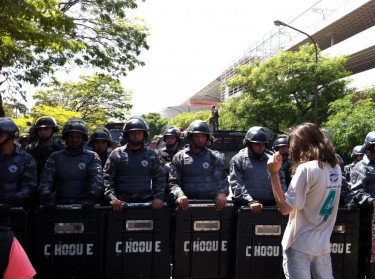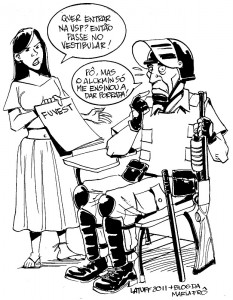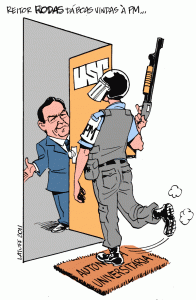[All links lead to Portuguese language pages except when otherwise noted.]
On the morning of November 8, 2011, the military police (MP) cleared by force the Dean’s office building of Sao Paulo University (SPU). The building had been occupied by nearly 70 students since October 27, in protest over the arrest of three students for smoking marijuana. (See Global Voices’ report [en] on the original incident.)
The November 8 operation involved around 400 policemen from the MP’s Shock Troops belonging to the Special Operations forces and MP cavalry.
Jornalist Shayene Metri from Campus Journal covered this story:
Muitos PMs chegaram, saindo de carros, motos, ônibus, caminhões. Apareceram helicópteros e cavalaria. Nem eu e, acredito, nem a maior parte dos presentes já tinham visto tanto policial em ação.
[…]
Os estudantes que enfrentavam de verdade os policiais que faziam a ‘corrente’ em torno da Reitoria eram levados para dentro. Em questões de segundos, um estudante sumia da minha frente e era levado pra dentro do cerco.
[…]
Students who really stood up to the policemen, who had formed a “chain” around the Dean’s office building, were taken inside. In a matter of seconds, students vanished from my view, having been taken inside the enclosure.
Seventy students were taken to the 91st delegacy of Sao Paulo’s Civilian Police to provide statements about the Dean’s office building occupation. They were released only after bail was posted on their behalf by the USP’s workers syndicate, reported journalist Paulo Moreira Leite, who added:
Lá fora, muitos estudantes diziam — com convicção — que seu movimento expressa a alvorada de um levante popular, exemplo do que acontece com a insurreição estudantil no Chile, a revolta dos indignados na Espanha, a ocupação de Wall Street e tudo mais. Na sala com os delegados, ouvia-se argumentos típicos da polícia política do regime miltar.
Legitimacy of the student’s movement

MPs shock troops, with unidentified policemen, reunited in front of the Dean’s office. Photo from the Colective Passa Palavra, Copyleft
In a speech issued after their removal, students declared that “the incident of October 27, the arrest of the three students for carrying marijuana, was not the main catalyst for the student’s demands. On the contrary, it had been the last straw to pre-existing insatisfactions” with the SPU’s security model and the lack of transparency from the Dean’s office.
More can be read about their demands and protests against the presence of the MP on the SPU campus on journalist Leonardo Sakamoto’s blog, in his interview with the directors of the Central Directorate of SPU’s students.
Students have been organizing themselves in assemblies, and on November 7 about a thousand of them came together to deliberate whether to continue their course of action or change tactics. Despite the fact that votes in favor for the ending of the occupation won by a close margin, some radical elements decided to maintain the occupation. Knowing that it was considered illegal by law enforcement, the main student body refused to accept a violent intervention by the police.
Blogger Eduardo Guimarães comments that the method or legitimacy of the occupation is immaterial:
Não dá para criticar os estudantes da USP. Pouco importa se o método que escolheram para protestar contra o aumento do efetivo da PM no campus foi equivocado. Quando o governo monta uma operação de guerra com um contingente policial desse tamanho enquanto a cidade pena nas mãos dos bandidos, tudo mais perde o sentido.
University under militarization
The MP’s presence on the campus is the result of an arrangement between SPU and the military police, made after Filipe Ramos de Paivas’s assassination, as explained by Daniel Lopes, editor of the blog Amálgama, who indicates that it caused “a drastic drop in criminality”. Despite this fact, students are denouncing the police presence, which contested Dean Joao Grandino Rodas has called a provocation on their part.
Rodas is considered to have taken office illegitimately as he wasn’t elected by vote, having been appointed by the then governor, José Serra. Journalist Gilherme Scazili believes that “since recent events, the University’s management model imposed by the state government has lost its last bit of legitimacy”.
According to cartoonist Carlos Latuff:
Dado o histórico autoritário do atual reitor da USP, não é dificil perceber que o real interesse de Rodas está longe de ser a segurança no campus e sim a instalação de um aparato de repressão para não só impor as políticas do governador Geraldo Alckmin, como também reprimir movimentos sociais, nesse caso em particular, a organização de estudantes, professores e funcionários da universidade.
Student and activist Hugo Albuquerque concurs:
Quando falamos em militarização do campus, não estamos, de modo algum, exagerando. O que ocorre é o contrário: estamos normalmente esquecidos que, embora o Brasil tenha se tornado uma democracia à moda ocidental – com todas as suas boas-intenções e bom-mocismos -, ainda temos como principal força de segurança policial um corpo militar com poder sobre a população civil em tempos de paz. Pior do que isso, só mesmo a decisão política de colocar tal força para dentro de uma instituição de ensino – ou, quem sabe, fazer isso e esperar que não ocorra nenhum incidente.
In a text published by the blogger Conceição Oliveira, students like Yacov Fidélis complain about the media's exaggeration of their actions and society’s reaction:
passou a vender a imagem de que os estudantes rebeldes estavam dispostos a quebrar tudo e deixar a vida de seus colegas à mercê de bandidos só para poderem fumar maconha em paz.
Professor and blogger Chico Bicudo went further, selecting a series of verbal attacks against the students, and criticizing the use of some adjectives and typical sentences:
(…) os estudantes da USP são “maconheiros e mimados”. O adjetivo é o argumento de quem não tem argumentos. Reduz o mundo complexo a uma marca – repetida exaustivamente, transforma-se em rótulo, que não desgruda mais. Funciona para desqualificar, para agredir, para achincalhar, para impor falsas verdades. Jamais para debater. Porque, para tanto, é preciso estar disposto a ouvir, a descobrir, a mergulhar, a pensar – e não só a reproduzir qualidades ou defeitos colhidos aos quatro cantos.
Jornalist Marcelo Rubens concludes:
Venceram a generalização, o debate político raso e o Estado maniqueísta.
Perderam a dialética e os movimentos sociais.
Perdeu a DEMOCRACIA [o diálogo].
Sim, a violência urbana pede a PM no campus universitário. A maioria estudantil, idem.
Mas não esta PM mal treinada, viciada em extorsão a maconheiros, pragmática.
The generalization, low political debate and manipulative state won.
Dialectics and social movements lost.
Democracy lost.
Yes, urban violence asks for the MP’s presence in the campus. Most students ask it too.
But not this untrained MP, addicted to extortion to marijuana smokers and pragmatic.
After these events, USP students reunited in assembly have decided to call teachers and functionaries for a strike. Solidarity with the movement has come from other universities, such as UNICAMP'S teachers and functionaries, and students from UNESP, and student strikes are threatening to spread to other universities in Sao Paulo.









